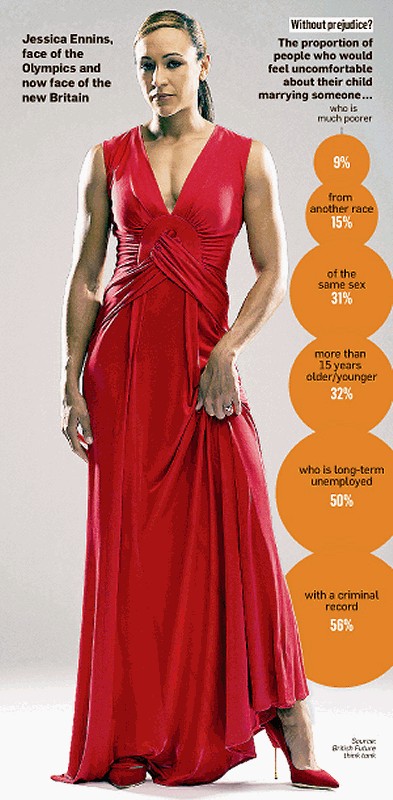
Mixed-race Brits rising fast as prejudice wanes
By Dipesh Gadher from The Sunday Times of 9 December 2012
 Jessica Ennis, face of the Olympics and now face of the new Britain (Graham Hughes)
Jessica Ennis, face of the Olympics and now face of the new Britain (Graham Hughes)
MIXED-RACE Britons, epitomised* by Jessica Ennis, the Olympic heptathlon* champion, are among the nation’s fastest-growing ethnic-minority groups, according to official figures.
New data from the 2011 census to be published on Tuesday is expected to show that at least 1m people were born to parents from different ethnicities.
Academics believe the true number of people from a mixed-race background could be twice this amount, because many of them identified themselves in other categories, such as black or white, on census forms.
The findings coincide with new polling that reveals only 15% of people feel uncomfortable about interracial marriages.
Twenty years ago, 40% of Britons expressed concerns about such relationships.
The polling, commissioned by British Future, a think tank focusing on identity and integration, shows that such prejudice is even lower among young people, with only 5% of those aged 18-24 saying they would feel uncomfortable if their child got married to or was in a relationship with someone of another race.
In fact, this age group feels more concerned by the prospect of their offspring marrying someone from a much wealthier background.
“Jessica Ennis was not just the face of the Olympics this summer; she could stake a fair claim* to be the face of the census, too,” said Sunder Katwala, director of British Future.
Ennis’s father, Vinnie, is from Jamaica, while her mother, Alison, hails from* Derbyshire.
In another sign that the 26-year-old athlete closely reflects melting-pot Britain, Ennis’s fiancé, Andy Hill, is white.
This week’s breakdown of census data is likely to rank British Indians as the largest ethnic-minority group. However, the number of people who identify themselves as mixed race has rapidly increased from 677,000 in the 2001 census.
Experts believe that among under-16s the mixed-race category is already the largest minority.
The 2011 figures are also expected to confirm that there are now more than 2m Muslims in the country, consolidating Islam’s position as the fastest-growing faith.
British Future polled more than 2,000 adults. Its findings, to be published in a report to coincide with the census data, show that women (66%) are more comfortable with mixed marriages than men (58%).
Those from a mixed-race background themselves (87%) are the most open to such relationships, compared with 57% of Asians and 60% of whites.
Surprisingly, a greater proportion of respondents in London (14%) feel uncomfortable with interracial marriages than those in Scotland (9%), the most tolerant region.
When asked to think about their children or grandchildren being in a serious relationship, the scenario that raised the most concern overall was if the other person had a criminal record.
Almost a third of people still feel uncomfortable about a relationship involving someone of the same sex (31%) or a person who is more than 15 years older or younger (32%).
Almost half (47%) of people believe the growth of interracial relationships is a good thing and will help further integration, compared with 21% who disagree.
Rob Ford, an expert in diversity and migration at Manchester University, said: “Britain’s minorities seem to be following a similar path of integration trodden by many immigrants, such as the Irish, Poles and Italians, in America — gradually merging with the majority group until ethnic differences are no longer noticed or relevant.”
It is therefore perhaps not that surprising that while 42% of people polled by British Future correctly recognised Ennis as mixed race, 29% identified her as white.
590 words
Annotations:
* to epitomise sth - etwas verkörpern
* heptathlon - Siebenkampf
* to stake out a claim - Ansprüche anmelden
* to hail from - herkommen von/aus
Assignments:
1. Do you think Jessica Ennis is a typical British example of a daughter from an interracial marriage?
2. What difficulties might interracial couples face if one of the couple is from Indian or Pakistani descent?
3. Does it surprise you that London respondents have more reservations against interracial marriages than Scottish people?
4. Same sex marriages are considered sceptically by 31%. Would the figure be similar if Germans were asked?
5. What in your opinion is the most astonishing figure by the poll which you would disagree to?
|

 Jessica Ennis, face of the Olympics and now face of the new Britain (Graham Hughes)
Jessica Ennis, face of the Olympics and now face of the new Britain (Graham Hughes)